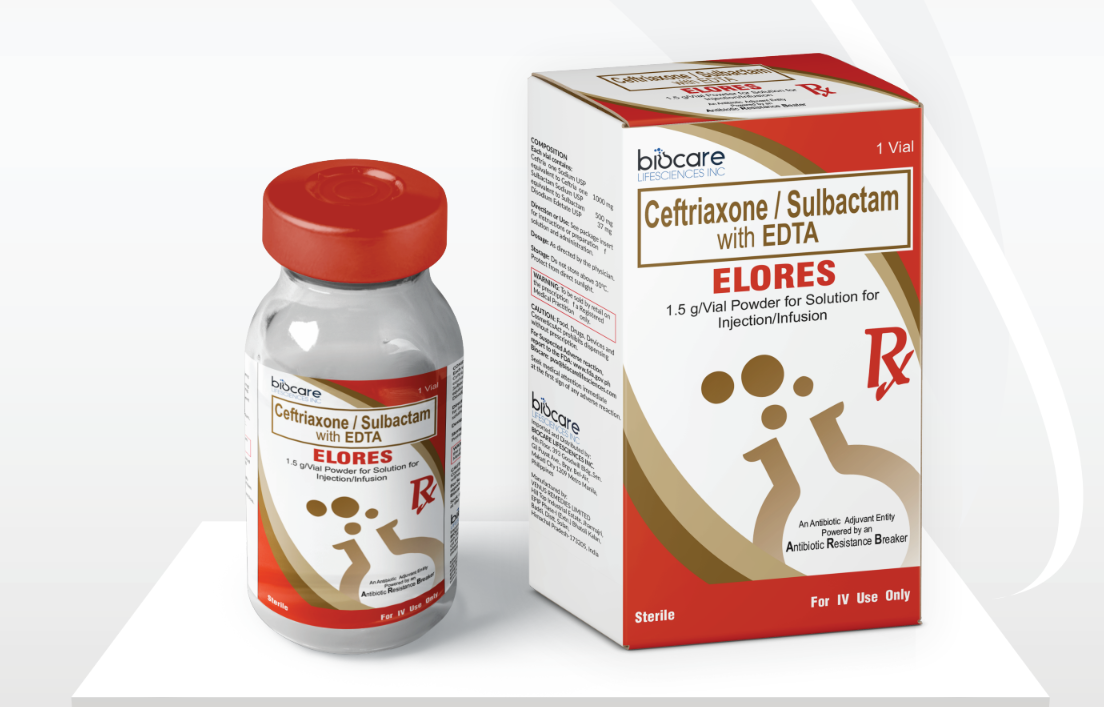ELORES

Ceftriaxone / Sulbactam
ELORES
1.5 g/Vial Powder for Solution for Injection/Infusion
A Reliable Carbapenem Sparer
65% of all microbial infections are associated with biofilm formation:
National Institute of Health, US
Over-reliance on empirical piperacillin tazobactam and, for treatment feilure.
has driven and will drive selection for resitance to these agents
British Society for Antimicrobial Chemotherapy Healthcare Infection Society/British Infection Association Joint Working Party 2018
Antibiotic Resistance Breakers offers the most effective way to combat AMR in these high this high priority pathogens.
Biofilms Infections occured due to External devices
- Ventilator (Ventilator Aquired Pneumonia)
- Urinary Catheter (cUTI)
- Ryle Tube
- Implants
- Central Line
- Surgical Devices
Synergistic action of Ceftriaxone, Sulbactam and Disodium edentrate
- Provided activity againts ESBLs
- Provides additional activity against
MBLs - Prevents and eradicates bacterial biofilms
- Results in efflux pump inhibition
- Control spreading of resistant genes
- Increase Bacterial Membrane Porosity
EDTA disrupts intercellular bindings of Biofilm
- Elores can break Biofilm
- Antibiotic can enter bacteria
Pneunomia and cUTI
at High Risk of ESBL Enterobacterialceae
- Contact with healthcare system
- Continuous Ambulatory
Peritoneal Dialysis (CAPD) - Without/minimal invasive procedures
- Patients old (>65 years)
with few co-morbidities - Antibiotic therapy
in last 90 days - 1.5g to 3.0g B.D. with slow infusion of 90 minutes in minimum 100ml normal saline.
- No dose adjustment for Hepatic and Renal impaired patients (>10 ml/min CrCl
(eg recent hospital admission nursing home)

Formulation
Each vial contains:
Ceftria one Sodium USP
| Ceftria one sodium USP – equivalent to Ceftria one | Sulbactram Sodium USP – equivalent to Sulbactram | Disodium edetate (EDTA) USP |
|---|---|---|
| 1000 mg | 500 mg | 37 mg |
View Complete Product Information
ELORES
1.5 g/Vial Powder for Solution for Injection/Infusion A Reliable Carbapenem Sparer 65% of all microbial infections are associated with biofilm formation: National Institute of Health, US Over-reliance on empirical piperacillin tazobactam and, for treatment feilure. has driven and will drive selection for resitance to these agents British Society for Antimicrobial Chemotherapy Healthcare Infection Society/British Infection Association Joint Working Party 2018 Antibiotic Resistance Breakers offers the most effective way to combat AMR in these high this high priority pathogens. Biofilms Infections occured due to External devices- Ventilator (Ventilator Aquired Pneumonia)
- Urinary Catheter (cUTI)
- Ryle Tube
- Implants
- Central Line
- Surgical Devices
- Provided activity againts ESBLs
- Provides additional activity against MBLs
- Prevents and eradicates bacterial biofilms
- Results in efflux pump inhibition
- Control spreading of resistant genes
- Increase Bacterial Membrane Porosity
- Elores can break Biofilm
- Antibiotic can enter bacteria
-
- Contact with healthcare system
- Continuous Ambulatory Peritoneal Dialysis (CAPD)
- Without/minimal invasive procedures
- Patients old (>65 years) with few co-morbidities
- Antibiotic therapy in last 90 days
- 1.5g to 3.0g B.D. with slow infusion of 90 minutes in minimum 100ml normal saline.
- No dose adjustment for Hepatic and Renal impaired patients (>10 ml/min CrCl


